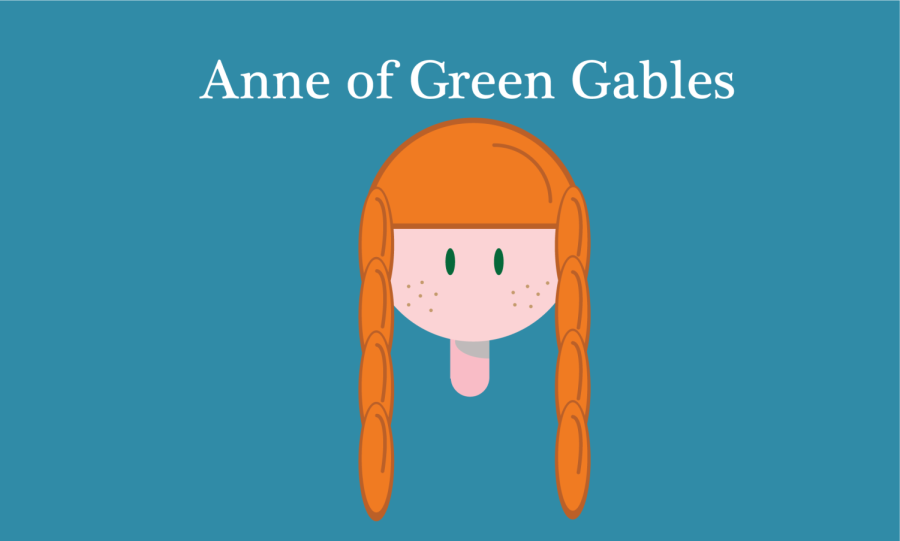REVIEW: Anne of Green Gables remains relevant to today’s teen
Image of title character, Anne Shirley. Infographic by Isabella Edghill.
August 29, 2022
It was that time of summer when my brain had begun to feel numb, and boredom had fully seeped in, when I desperately reached for a book to provide some much-needed mental stimulation. A dark green cover protected the yellowing pages of “Anne of Green Gables.” As I proceeded to read the novel, I was struck by how this old classic resonated with my 21st-century adolescent experience and how much I learned from Anne.
“Anne of Green Gables” by L. M. Montgomery is a coming-of-age story set in 19th century British Columbia. At the start, an 11-year-old named Anna Shirley is adopted by Matthew and Marilla Cuthbert. Anne is imaginative, full of spunk and melodramatic. The book follows Anne on many great adventures as she ages, such as making friends and competing in school with her arch nemesis Gilbert. She also acquaints herself with the tree outside her window. She imagines wild stories and acts them out in her secret hideaway. She also studies hard, striving to be top of her class. She’s a relatable teen on the same journey of discovery as us all.
One of the biggest challenges Anne must overcome throughout the book is learning to accept herself. An avid daydreamer, Anne spends many hours dreaming of the type of person she wants to be. She wishes for raven black hair, an elegant name like Cordelia and dresses with puffed sleeves. Looking in her mirror; Anne despises her freckles, red hair and plain attire. She is dissatisfied with almost everything about herself for the majority of the book.
Most teens can relate to this, as we tend to spend too much time trying to be “better”. Taller, thinner prettier funnier and smarter. Like Anne; we are still trying to figure out who we are, so that process tends to help us discover what we dislike about ourselves. Eventually; Anne learns she is beautiful on the outside and inside, even with a plain name like Anne. She teaches us that our energy is better spent changing our mindsets rather than longing to be someone we will never be.
Another reason Anne is such a relatable character, even in modern times, is because she is imperfect. As teenagers, we think trivial blunders will inevitably lead to tragic consequences. Tripping down the stairs in school equals a lifetime of social isolation. A bad hair day means you become the laughing stock of the town. A voice crack during an English presentation leads to your ultimate demise. Like Anne, our teenage brains tend to catastrophize.
Anne learns to embrace her embarrassing mistakes instead of treating them as her doom. She accidentally puts anodyne liniment in her cakes instead of vanilla, dyes her hair green instead of black and accidentally gets her best friend drunk. Through all this, Anne teaches us it’s okay to make mistakes. At the beginning of the book, whenever Anne struggles she acts as if it were the end of the world, but ultimately she later learns to laugh at herself and her mistakes. She learns to focus on solving her own problems, rather than declaring her life ruined by embarrassment.
“Anne of Green Gables” teaches audiences to never abandon the whimsical nature of adolescence. As teenagers, it’s easy to get bogged down by homework and trying to be “cool”, but this can make us grow up too fast, abandoning youth far too soon. Anne says that it’s ok to play with fairies, build secret hideaways in the woods and write magical stories of heroism and bravery just for fun. She teaches us to romanticize our lives and embrace our imaginations wholeheartedly.
“Anne of Green Gables” may be set roughly 200 years ago, but the story and the lessons it holds remain relevant to our modern-day teenage turmoil. Anne teaches us to love ourselves without loathing, and that falling doesn’t mean we can’t just get back up and embrace the world wholeheartedly. Readers will fall in love with spunky Anne and her mischievous wit. All teens should consider reading “Anne of Green Gables” because it holds meaningful lessons presented comically and with just a hint of moxie. Every page has a new entertaining story waiting to be discovered by teen readers just like us.









